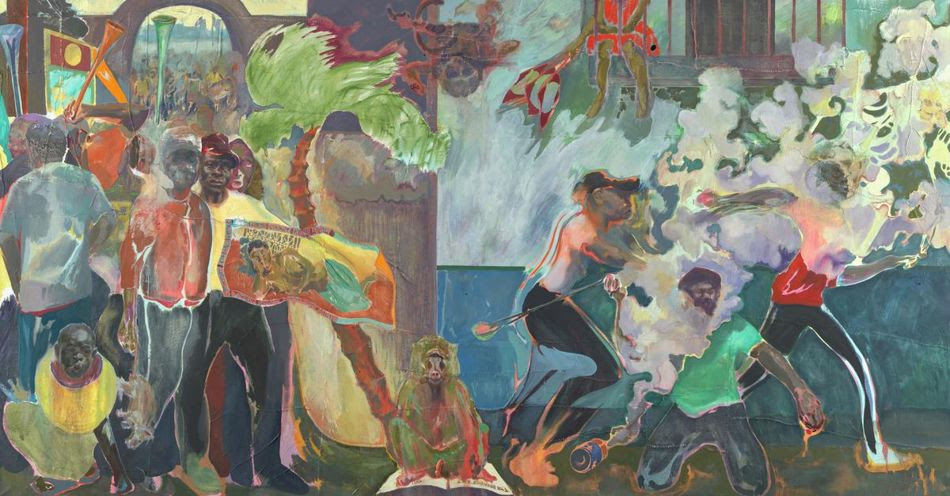We Need to Reverse the Culture of Decay and March on the Street for a Culture of Humanity
Michael Armitage (Kenya), The Promised Land, 2019.
The final months of 2023 pierced our sense of hope and threw us into a kind of mortal sadness. Israel’s escalating violence has killed more than twenty thousand Palestinians to date, wiping out entire generations of families. Horrifying images and testimonies from Palestine have flooded all forms of media, stirring a deep sense of anguish and outrage among large sections of the global population. At the same time, in keeping with the zigs and zags of history, this collective sorrow has been transformed into collective strength. Hundreds of millions of people around the world have taken to the streets day after day, week after week, to express their vehement opposition to Israel’s Permanent Nakba against Palestinians. New generations around the world have been radicalised by the struggle for Palestinian emancipation and against the hypocrisy of the NATO-G7 bloc. Any remaining credibility held by Western ‘humanitarian’ rhetoric died on 8 December when the United States’ deputy ambassador to the United Nations, Robert Wood, raised his lonely hand in the United Nations Security Council to cast the sole vote against a resolution calling for a ceasefire in Gaza, using the US’s veto power to block the measure (this was the third time that the US has blocked a resolution calling for a ceasefire since 7 October).
Meanwhile, south of Palestine, in Dubai (United Arab Emirates), the states of the world met for the 28th Conference of Parties (COP28) on climate change from 30 November to 12 December. The official meetings seemed to be garrisoned by transnational energy companies, who stood alongside the former colonial powers in making solemn pronouncements while refusing to commit to reducing excess carbon emissions. None of the agreements reached in Dubai have the status of law; they are merely benchmarks that countries are not compelled to reach. ‘We didn’t turn the page on the fossil fuel era’, said UN Climate Change Executive Secretary Simon Stiell. COP28, he continued, ‘is the beginning of the end’.
After twenty-eight years of mediocrity, it would be fair to ask if Stiell was referring to the end of the world rather than the fossil fuel era. The former interpretation is supported by UN Secretary General António Guterres’s announcement in July that ‘The era of global warming has ended. The era of global boiling has arrived’. No protests were possible at Expo City Dubai, where COP28 was held. As COP28 ended, the centre had to be hastily emptied because Winter City needed to be set up in this desert port, where Santa and his reindeers, bathed in fake snow, invite Christmas shoppers to join their ‘vital eco-mission activities’. Far away from Dubai, protestors hold up signs that read, ‘The ocean is rising and so are we’.
Emilio Vedova (Italy), Contemporary Crucifixion no. 4, 1953.
These protests for Palestine and for the planet bang at the door of modern civilisation, which is suffused with decay. The banality of social inequality and the normalisation of war belie the assumption that mass suffering and death are insurmountable and acceptable. It is not only political leaders who speak with iron in their voice, but also those who produce elements of our culture, whether in the entertainment or education industry. Concepts such as freedom and justice are treated as abstractions that can be bandied about here and there, mutilated by people who make war in their name. In politics, in entertainment, in education, and in other areas of modern life, these concepts are taken out of history and treated as products, just like the goods produced by workers are taken out of their context and treated as commodities. Freedom and justice are not abstractions but ideas and practices born of the brave struggles of hundreds of millions of people throughout history, ordinary people who sacrificed themselves for the good of future generations. They produced these words not for textbooks and courts of law, but for us to continue to refine and expand their meaning in our own fights and turn them into reality.
We protest to give these concepts, freedom and justice, meaning and return them to their authentic history. We understand with great joy that humanity will only be redeemed through praxis, what Karl Marx defined as the ‘free, conscious activity’ that allows us to create and shape the reality around us. Standing up for one’s beliefs is not just about trying to change a policy, whether to stop a war or lessen social inequality; it is to radically refuse the culture of decay and affirm the culture of a possible humanity. Praxis does not take place as the noble activity of the individual, the lonely vigil conducted for moral reasons that are as abstract as the ahistorical use of the terms freedom and justice. Praxis can only inaugurate a new culture if it takes place collectively, producing as it marches a joyous set of new relationships and certainties.
Antonio Jose Guzman (Panama) and Iva Jankovic (Yugoslavia), photograph of the work Transatlantic Stargate, 2023.
The purpose of Tricontinental: Institute for Social Research is not to be the archivist of a decaying civilisation, but to be part of the great current of humanity that – through its praxis – will return genuine hope to the world. Our institute, which was launched in March 2018, has built a considerable body of work, including over seventy monthly dossiers, never missing a deadline. Last month, you received our seventy-first dossier, Culture as a Weapon of Struggle: The Medu Art Ensemble and Southern African Liberation, which celebrated and highlighted the necessity of cultural production rooted in praxis. The efficiency of the team at Tricontinental: Institute for Social Research is remarkable. They work day and night to bring you the kind of material that is absent from our global dialogue. This coming year we plan to bring you twelve dossiers on the following topics:
- The new mood in the Global South and the churning of the global order, in collaboration with Global South Insights.
- The People’s Science Movement in Karnataka, India.
- Nepal and the Millennium Challenge Corporation, in collaboration with Bampanth (‘The Left’) magazine.
- Forty years of the Landless Workers’ Movement (MST) in Brazil.
- Northeast Asia and the New Cold War, in collaboration with the International Strategy Centre and No Cold War.
- The Congolese struggle to control their own resources, in collaboration with the Centre Culturel Andrée Blouin.
- Multipolarity and Latin American development models.
- The cultural politics of the Telangana movement.
- Why the right is advancing in Latin America.
- The struggles of landless workers in Tanzania, in collaboration with the Movement of Agricultural Workers (MVIWATA).
- Transnational corporate corruption in Africa.
- The situation of the working class in Latin America.
Your feedback, as always, is essential.
Vijay Prashad is an Indian historian and journalist. Prashad is the author of twenty-five books, including The Darker Nations: A People’s History of the Third World and The Poorer Nations: A Possible History of the Global South. Read other articles by Vijay, or visit Vijay's website.


